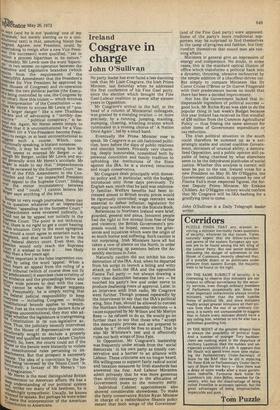Ireland
Cosgrave in charge
John O'Sullivan
No party leader has ever faced a less daunting task than Mr Liam Cosgrave, the Irish Prime Minister, last Saturday when he addressed the first conference of his Fine Gael party, since the election which brought the Fine Gael-Labour coalition to power after sixteen years in Opposition.
Mr Cosgrave's arrival in the hall, at the head of a column of Ministerial colleagues, was greeted by a standing ovation — or, more precisely, by a running, jumping, standing, stamping, cheering, whistling ovation which culminated in a rousing chorus of 'A Nation Once Again ', led by a small band.
Eventually the Prime Minister rose to speak. Mr Cosgrave is an old-fashioned politician, born before the days of public relations and identikit leaders. Privately very charming, deeply honourable, committed both by personal conviction and family tradition to upholding the institutions of the State against the IRA, he is a shrewd, tenacious and tough conservative.
Mr Cosgrave dealt principally with domestic policy and, in particular, with the budget, introduced only three days previously. To English ears, much that he said was ominously familiar. Welfare benefits had been increased almost to British levels; prices would be rigorously controlled; wage restraint was essential to defeat inflation; legislation for equal pay would soon be on the Statute Book.
References to Northern Ireland were brief, guarded, general and pious. Innocent people had the right to live normal lives free of fear and violence; the British Government's proposals would, he hoped, remove the grievances and injustices which were the origin of so much horror and suffering. Such caution is not surprising. Irish Ministers have all but taken a vow of silence on the North, in order to avoid stirring up passions before the Assembly elections in June.
Naturally caution did not inhibit his condemnation of the IRA. And, when he departed from his script to launch a biting and witty attack on both the IRA and the opposition Fianna Fail party — not always drawing a very clear distinction between the two — he touched his party's law and order nerve to produce deafening roars of approval. Later, in an interview with Irish radio, Mr Cosgrave went further. Though pressed repeatedly by the interviewer to say that the IRA's political wing, Sinn Fein, should be allowed to contest the Northern Ireland Assembly elections — a cause supported by Mr Wilson and Mr Merlyn Rees — he refused to do so. He would go no further than to say that those who "accept the democratic process and are prepared to abide by it " should be free to stand. That is also Mr Whitelaw's test and it effectively rules out both wings of Sinn Fein.
In Opposition, Mr Cosgrave's leadership was frequently under attack from the 'social democrats' in his own party as timidly conservative and a barrier to an alliance with Labour. These criticisms are no longer heard. His willingness to support fairly radical social and taxation measures by Irish standards has answered the first. And Labour Ministers admit privately that he was more generous than strictly necessary in the allocation of Government posts to the minority party.
Individual Cabinet appointments also showed considerable shrewdness. To make the fairly conservative Richie Ryan Minister in charge of a redistributive finance policy meant that both wings of the Governmer (and of the Fine Gael party) were appeased. Some of the party's more traditional supporters may be surprised to find themselves in the camp of progress and fashion, but they comfort themselves that sound men are running affairs.
Ministers in general give an impression of energy and competence. No doubt, in some cases, this is the standard optical illusion of office which transforms a political hack into a dynamic, thrusting, abrasive technocrat by the simple addition of a chauffeur-driven car. But simply to compare Ministers like Dr Conor Cruise O'Brien or Dr Garret Fitzgerald with their predecessors leaves no doubt that there has been a decided improvement.
Nor has the Government lacked that indispensable ingredient of political success — good luck. Mr Richie Ryan was able to do the popular thing in last week's Budget because this year Ireland has received its first windfall of £30 million from the Common Agricultural Policy — thus freeing the same amount for other items of Government expenditure or tax reduction.
The Irish political situation in the south could therefore be summed up as a surprisingly stable and united coalition Government, ministers of unusual ability, a demoralised Opposition, and a public opinion still capable of being charmed by what elsewhere seem to be the dehydrated platitudes of social justice. Whether this analysis is correct will soon be put to the test. Ireland votes for a new President on May 30. Mr O'Higgins, the Government candidate, is opposed by one of Fianna Fail's most respected figures, the former Deputy Prime Minister, Mr Erskine Childers. An O'Higgins victory would confirm that Mr Cosgrave will be IRA-bashing for a gratifying time to come.
John O'Sullivan is a Daily Telegraph leader writer.


































 Previous page
Previous page